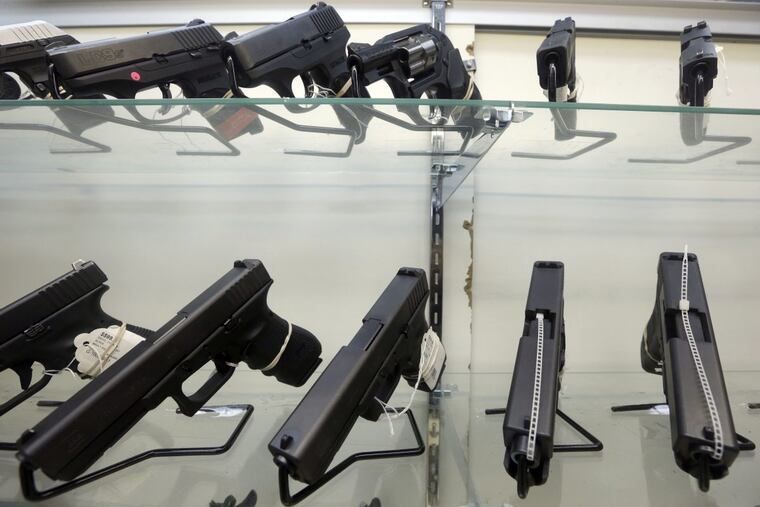Gun insurance: The NRA and Chubb sell protection for shooters
When shooting at people, "you can do everything right, and still lose," the National Rifle Association warns gun owners in its insurance sales pitch.

The National Rifle Association had no instant comment about the lone gunman who exercised his Second Amendment rights to buy trunkloads of guns and bullets, then used some to terrorize and murder 58 country-music fans and other non-combatants and send nearly 500 more to hospitals in Las Vegas, leaving families, taxpayers, insurers and employers to pay for the gunshot-wound victims' painful recoveries.
But you can't say the NRA isn't doing anything to cope with costs of gun violence.
Its allies may have squashed efforts in Congress and the Pennsylvania General Assembly to force gun owners to carry liability insurance, as states require drivers to. But earlier this year, the NRA itself began peddling a new line of gun owners' insurance, to help policyholders who shoot people pay for criminal-defense lawyers and damage claims by people the NRA's marketing materials call "alleged victims."
Since April, the firearms-advocacy group, which has lobbied hard and mostly successfully to give civilians access to a wider range of guns and bullets, has been offering a new line of NRA Carry Guard insurance. Policies start at $13.95 a month —for "Bronze" coverage, paying a shooter's criminal-defense lawyer up to $50,000, plus $200,000 for "bodily injury and property damage — and go up to $49.95 a month for "Gold Plus" — which promises $250,000 for criminal defense and $1.5 million in damage claims.
When shooting at people, "you can do everything right and still lose," the NRA warns in its insurance pitch, which is illustrated by an unsmiling spokeswoman brandishing an insurance card.
"Without insurance, lawful self-defense can cost a fortune," the pitch goes on. It lists costs Carry Guard might cover in addition to legal bills: bail money; replacement earnings (maybe you didn't get bail, or your trial drags on); cleanup costs (if you shoot someone in your home); "psychological support counseling"; and more.
The pitch also includes basic legal advice: When you shoot someone and the police arrive, do what officers tell you — but don't tell them what happened until you hire a lawyer who knows gun laws. If you don't happen to have a sharp shooting-defense lawyer on your speed dial when the cops call, the policy managers can help you find one.
Why would I need insurance, the NRA posits in its frequently asked questions, if I would shoot someone only in self-defense? Because "many homeowners' policies have limitations or exclusions related to intentional acts, such as self-defense."
The policies are underwritten by Westchester, a unit of Chubb, one of the nation's most successful and best-run property and casualty insurers. (Chubb, which occupies two towers overlooking Independence Hall in Philadelphia, is run by bosses in New York but legally based in Switzerland, which helps cut income taxes on its nearly $100 million in weekly profits by about half, compared with U.S.-based insurers such as Pennsylvania's Erie Indemnity.)
Chubb spokesman Jeffrey Zack told me his company doesn't like to talk about how many policies it sells to gun owners, or any other group, and directed me to the NRA's marketing materials. The NRA hasn't responded to requests for data on its gun-insurance sales, or how often members have actually been sued or prosecuted.
Carry Guard is more than another premium to pay, the NRA says: The program includes live gun training "developed by an elite cadre of law enforcement, military and legal experts." (I took NRA-approved shooting and safety training years ago, and made sure my sons did. We didn't keep guns in the house while they grew up; like chainsaws and power drills, we saw guns as tools for professionals.)
If the sales campaign is successful, will stepping up gun-insurance sales and profits change the NRA? Its insurance partners are now collecting personal information and claims data that will be used to better measure and price the risks of gun ownership, socializing the costs among firearms owners. That knowledge will eventually affect gun availability, pricing, handling, and public policy. That's how insurance works.
Insurance tends not to protect people who commit clearly criminal acts. But you can still expect long ugly litigation for the murders in Vegas.
"When the search for sources of funds gets underway, it will begin with entities that are allegedly responsible for the attack and their insurers, which are much more likely to have larger policies than that of any individual gun owner," says Randy Maniloff, a veteran insurance lawyer at Philadelphia-based White and Williams LLP and publisher of the biweekly insurance newsletter Coverage Opinions.
Added Maniloff: "I would not be surprised to see claims against Mandalay Bay," the casino-hotel the killer used as his base, "for failing to prevent the shooter from getting into the casino with an arsenal."